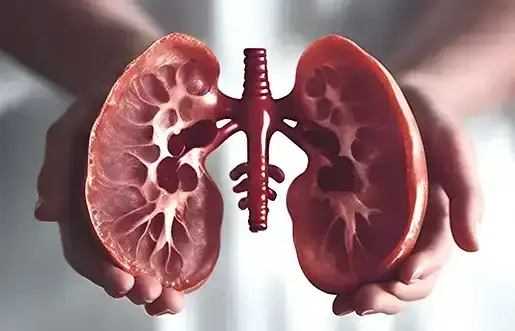What is Proteinuria?
Proteinuria is a medical condition characterized by the presence of an abnormal amount of protein in the urine. Normally, the kidneys filter waste products and excess substances from the blood, including proteins, which are then excreted in the urine. However, when the filtration process is compromised, proteins that are typically retained in the blood may pass into the urine.
Proteins in the urine can be a sign of underlying kidney problems or other medical conditions. The most common type of protein found in urine is albumin, and the condition where albumin is specifically detected in urine is referred to as albuminuria. Proteinuria can be detected through urine tests, and the severity can range from mild to severe.
Book Free Consultation
Causes Of Proteinuria
- Glomerular diseases: These affect the glomeruli, tiny filters in the kidneys that remove waste from the blood. Examples include membranous nephropathy and minimal change disease.
- Tubulointerstitial diseases: These damage the tubules and interstitium, parts of the kidneys that reabsorb water and electrolytes. Examples include interstitial nephritis and polycystic kidney disease.
- Vascular diseases: These affect the blood vessels in the kidneys. Examples include renal artery stenosis and preeclampsia (a pregnancy complication).
- Overflow proteinuria: This occurs when the body produces too much protein, overwhelming the kidneys' ability to filter it out. Examples include multiple myeloma and light chain deposition disease.
- Hereditary causes: Some people are born with genetic conditions that can cause proteinuria. Examples include Alport syndrome and Fabry disease.
- Drugs and toxins: Certain medications and toxins can damage the kidneys and cause proteinuria. Examples include nonsteroidal anti-inflammatory drugs and gold salts.
- Systemic diseases: Some chronic diseases can affect the kidneys and cause proteinuria. Examples include diabetes mellitus and amyloidosis.
- Miscellaneous causes: In some cases, proteinuria can be caused by temporary factors such as severe exercise, heatstroke, or dehydration.
Symptoms Of Proteinuria
- Foamy or bubbly urine: Excessive air bubbles due to protein presence
- Swelling (edema): In hands, feet, ankles, belly, or face
- Increased urination (frequency): Especially at night
- Fatigue and difficulty concentrating: Due to kidney function decline
- High blood pressure: Often associated with kidney problems
- Shortness of breath: From fluid buildup in lungs (rare)
- Loss of appetite: Often linked to general feeling of illness
- Nausea and vomiting: Can occur in severe cases
- Muscle cramps, especially at night: Possible electrolyte imbalance
Additionally:
- Puffiness around eyes, especially in the morning
- General feeling of illness
- High cholesterol levels (sometimes)
Who is at a Higher Risk?
- Chronic kidney disease (CKD): This is the most common cause of proteinuria, as various kidney diseases damage the filters that normally prevent protein from leaking into urine.
- Diabetes: Both type 1 and type 2 diabetes can damage the kidneys over time, leading to proteinuria and potentially chronic kidney disease.
- High blood pressure (hypertension): Uncontrolled hypertension can also put stress on the kidneys and raise the risk of proteinuria.
- Autoimmune diseases: Conditions like lupus and Goodpasture's syndrome can attack the kidneys, leading to proteinuria.
- Certain infections: Severe infections such as urinary tract infections or glomerulonephritis (kidney inflammation) can cause temporary proteinuria.
- Multiple myeloma: This cancer of plasma cells in the bone marrow can produce abnormal proteins that damage the kidneys and cause proteinuria.
Demographic factors:
- Age: The risk of proteinuria increases with age, particularly after 65.
- Race and ethnicity: People of African American, Hispanic, Native American, and Pacific Islander descent are at higher risk of kidney disease and therefore proteinuria compared to Caucasians.
- Family history: Having a family history of kidney disease increases your risk of developing proteinuria yourself.
- Sex: While less common, men tend to have a slightly higher risk of proteinuria than women.
How To Diagnose Proteinuria?
Initial Screening:
- Urine dipstick test: A quick, simple test checking for protein levels in urine. Positive results with varying degrees (+1 to +4) indicate potential proteinuria.
- Urinalysis: Analyzes urine for appearance, clarity, chemical composition, and microscopic presence of blood cells or bacteria.
Further Assessments:
- Albumin-to-creatinine ratio (UACR): Measures the ratio of albumin (a specific protein) to creatinine (a muscle waste product) in urine. A UACR over 30mg/g may indicate proteinuria.
- 24-hour urine protein test: Collects all urine over 24 hours to measure total protein amount excreted. Useful for quantifying protein leakage and comparing UACR accuracy.
- Blood tests: Assess kidney function (creatinine levels) and potential underlying conditions like diabetes or autoimmune diseases.
Detailed Investigations:
- Imaging tests: Ultrasounds, CT scans, or MRIs provide detailed views of the kidneys and urinary tract to detect structural abnormalities.
- Kidney biopsy: In rare cases, extracting a small tissue sample from the kidney aids in definitive diagnosis of specific kidney diseases.
Complications Of Proteinuria
- Kidney failure: Proteinuria can be a sign of underlying kidney disease, and persistent, severe proteinuria can increase the risk of progressing to kidney failure.
- Cardiovascular disease: Proteinuria is a significant risk factor for cardiovascular problems like heart attack, stroke, and heart failure. This is because protein leakage can damage blood vessels and contribute to high blood pressure.
- Fluid overload: Excess protein in urine can disrupt the balance of fluids in the body, leading to swelling (edema) in the hands, feet, and ankles. In severe cases, fluid can build up in the lungs, causing pulmonary edema.
- Increased infection risk: Proteinuria can weaken the immune system, making individuals more susceptible to infections like pneumonia and urinary tract infections.
- Blood clots: Proteinuria can increase the risk of blood clots forming in the veins or arteries, including potentially dangerous kidney vein thrombosis.
- Decreased life expectancy: In some cases, especially with persistent and severe proteinuria, life expectancy can be shortened due to the increased risk of complications like kidney failure and cardiovascular disease.
Ayurvedic Treatment For Proteinuria
Ayurvedic treatment for proteinuria emphasizes lifestyle modifications, dietary changes, and herbal remedies. Natural cure for protein in urine involves incorporating specific foods and herbs that support kidney health. Additionally, maintaining a balanced lifestyle, including regular exercise and stress management, is crucial.
Proteinuria natural treatment involves the use of herbs known for their kidney-protective properties. Punarnava, a well-known Ayurvedic herb, is renowned for its diuretic and anti-inflammatory effects. This herb aids in reducing protein leakage in urine and supports overall kidney function.
Another potent herb in Ayurveda is Gokshura, which has anti-inflammatory properties and helps in maintaining healthy kidney function. Its diuretic effects contribute to flushing out toxins and reducing proteinuria.
Ayurvedic practitioners also recommend lifestyle modifications, including adopting a renal-friendly diet. This involves limiting the intake of processed foods, salt, and refined sugars, while increasing the consumption of fresh fruits, vegetables, and whole grains.
In Ayurveda, holistic well-being is crucial for managing proteinuria. Stress-reducing practices such as yoga and meditation are advocated to promote mental and physical balance. Ayurvedic treatment for proteinuria focuses on addressing the root cause and promoting overall health, providing a natural and comprehensive approach to managing this condition.
In conclusion, exploring Ayurvedic treatment for proteinuria can offer a natural and holistic approach to managing this condition. Incorporating kidney-supportive herbs, adopting a renal-friendly diet, and embracing a balanced lifestyle are key elements in the quest for a natural cure for protein in urine.
Ayurvedic Medicine For Proteinuria
Here are some Ayurvedic herbs that are often considered:
- Gokshura (Tribulus terrestris): Believed to have diuretic properties and thought to support kidney function.
- Punarnava (Boerhavia diffusa): Traditionally used in Ayurveda for kidney and urinary tract health, it is considered a natural diuretic.
- Shilajit: Thought to have rejuvenating properties and may be used to support overall kidney function.
- Varuna (Crataeva nurvala): Known for its diuretic and anti-inflammatory properties, it is traditionally used for urinary disorders.
- Chandan (Santalum album): Sandalwood is believed to have cooling and soothing properties and may be used to support kidney health.
- Tulsi (Ocimum sanctum): Also known as Holy Basil, Tulsi is considered an adaptogen and is used for its potential anti-inflammatory and antioxidant properties.
- Amla (Emblica officinalis): Rich in vitamin C, Amla is believed to have detoxifying properties and may support overall kidney health.
- Guduchi (Tinospora cordifolia): Known for its immunomodulatory effects, it may help in supporting the immune system and overall health.
Why Choose Karma Ayurveda
- Holistic Approach: They focus on treating the root cause of proteinuria through personalized herbal remedies, dietary modifications, and lifestyle changes.
- Experienced Specialists: Their team of highly skilled Ayurvedic kidney specialists tailor treatments to your specific needs and condition.
- Natural & Safe Treatments: They utilize time-tested Ayurvedic herbs and minerals, free from chemical additives, minimizing side effects.
- Promising Results: They claim improved kidney function, decreased protein leakage, and prevention of further complications like chronic kidney disease.
- Individualized Care: They offer a patient-centered approach, ensuring your comfort and addressing your concerns throughout the treatment.
- Reputation & Expertise: Established with a legacy of successfully treating complex kidney disorders, including proteinuria.
- Wide Range of Services: They provide various Ayurvedic therapies and detoxification procedures alongside herbal medicines.
- Dietary & Lifestyle Guidance: Their specialists offer personalized dietary plans and lifestyle modifications to complement the treatment.

